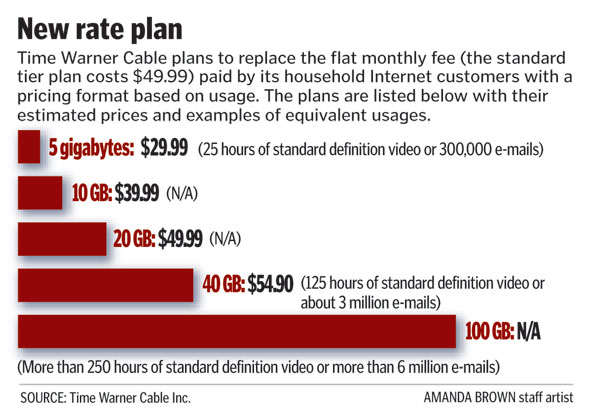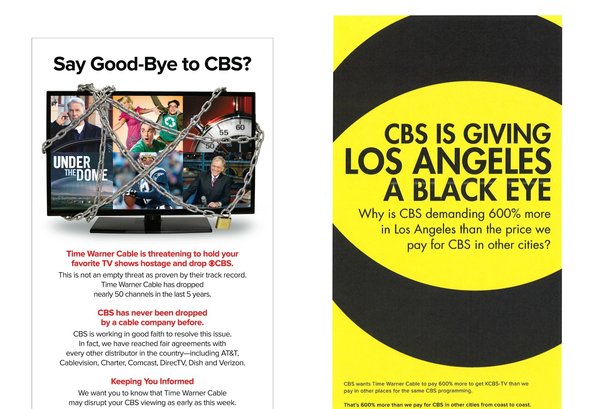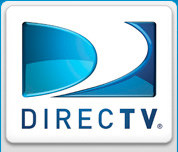
Within the hour viewers in New York, Los Angeles, and Dallas will know whether Time Warner Cable and CBS have managed to reach an agreement on retransmission consent, agree to further extend talks, or choose to pull the plug on CBS affiliates in the three cities, and a handful of independent stations with it.
Negotiations are said to be tense and down to the wire, with a weekend extension expiring at 5pm ET this afternoon. Time Warner Cable customers nationwide could experience the loss of Showtime if Time Warner Cable decides to drop the pay movie channel as a negotiating tactic.
CBS’ Les Moonves confirmed this afternoon the two sides remained at odds over the exact amount the cable operator will pay per viewer for CBS-owned local stations in the three cities. If an agreement is not reached, Time Warner Cable is likely to drop the channels this afternoon.
[flv width=”640″ height=”380″]http://www.phillipdampier.com/video/Bloomberg Will CBS Lose its Place on the TV Dial 7-29-13.flv[/flv]
Bloomberg News reports late this afternoon the two sides have still not reached an agreement and unless another extension is approved, CBS will be off the cable dial in New York, Dallas, and Los Angeles. (5 minutes)
 The cable operator upped the stakes late Friday reportedly threatening that if CBS does get removed, it will give up its coveted channel positions on Time Warner Cable indefinitely. In New York, WCBS occupies channel 2. In Los Angeles, KCBS is also on channel 2 and its sister station KCAL is on channel 9. In Dallas, KTVT is on Time Warner Cable channel 11. Low channel numbers have significant financial value to programmers, because it makes finding channels easier. Jeff Zucker from CNN has already expressed an interest is taking over channel 2 for CNN.
The cable operator upped the stakes late Friday reportedly threatening that if CBS does get removed, it will give up its coveted channel positions on Time Warner Cable indefinitely. In New York, WCBS occupies channel 2. In Los Angeles, KCBS is also on channel 2 and its sister station KCAL is on channel 9. In Dallas, KTVT is on Time Warner Cable channel 11. Low channel numbers have significant financial value to programmers, because it makes finding channels easier. Jeff Zucker from CNN has already expressed an interest is taking over channel 2 for CNN.
The dispute comes at the same time Time Warner Cable is notifying customers of rate increases on broadband and cable modem rentals. CBS is expected to recommend Time Warner customers switch to a competitor or watch shows online, presumably over TWC’s broadband service.
In Wisconsin, another retransmission consent fight with Journal Broadcast Group caused the cable company to drop those stations from its lineup. Among the stations affected in Wisconsin: WTMJ-TV (Channel 4) in Milwaukee and WGBA-TV in Green Bay, which carry Packer pre-season games, and WACY-TV in Appleton, which carries Spanish language pre-season broadcasts.

Ellis
State Senate president Mike Ellis (R-Neenah) wrote a letter to the cable company insisting that it give rebates to customers affected by the blackout.
“It is clear your customers are no longer receiving the service they are paying for,” Ellis wrote in a letter to the company last Friday.
But Time Warner Cable made it clear subscribers are not entitled to refunds when stations disappear from its lineup:
Stations “are sold as a package of channels. We change our programming packages from time to time, including by adding new networks to the lineup. It is not our practice to issue credits for individual networks that are offered in a package.”
In New York, City Council Speaker Christine Quinn has asked CBS and Time Warner Cable to keep the stations up and running on cable until the negotiations are resolved. If they don’t Quinn has threatened to hold an oversight hearing on the matter, although her power to affect the two companies is very limited.
[flv width=”534″ height=”320″]http://www.phillipdampier.com/video/NY1 Quinn Says Dont Interrupt Video 7-29-13.mp4[/flv]
NY1 reports on New York City mayoral candidate Christine Quinn’s request that CBS and Time Warner keep WCBS on the cable dial until the dispute can be resolved. (1 minute)


 Subscribe
Subscribe In addition to an August
In addition to an August 
 Time Warner Cable is once again
Time Warner Cable is once again  Several million Time Warner Cable and Bright House customers in New York, California, Texas and Florida will lose CBS programming this Wednesday at 5pm if the three companies do not iron out their differences in contract renewal negotiations.
Several million Time Warner Cable and Bright House customers in New York, California, Texas and Florida will lose CBS programming this Wednesday at 5pm if the three companies do not iron out their differences in contract renewal negotiations.


 Hulu’s new owners could continue to offer the service much the same way it is provided today, with a free and pay version. But most expect the new owners will throw up a programming “pay wall,” requiring users to authenticate themselves as a pay television customer before they can watch Hulu programming. If Time Warner Cable acquired a minority interest and the current owners stayed in place, Time Warner Cable TV customers could benefit from free access to certain premium Hulu content, now sold to others for $8 a month. That premium content would presumably be available to U-verse customers if AT&T emerges the top bidder, or DirecTV could offer Hulu to satellite subscribers to better compete with cable companies’ on-demand offerings.
Hulu’s new owners could continue to offer the service much the same way it is provided today, with a free and pay version. But most expect the new owners will throw up a programming “pay wall,” requiring users to authenticate themselves as a pay television customer before they can watch Hulu programming. If Time Warner Cable acquired a minority interest and the current owners stayed in place, Time Warner Cable TV customers could benefit from free access to certain premium Hulu content, now sold to others for $8 a month. That premium content would presumably be available to U-verse customers if AT&T emerges the top bidder, or DirecTV could offer Hulu to satellite subscribers to better compete with cable companies’ on-demand offerings. The Los Angeles Times reports that pay TV distributors are in a rush to make deals, not only to offer more viewing options for customers, but to potentially get rid of expensive and cumbersome set-top boxes.
The Los Angeles Times reports that pay TV distributors are in a rush to make deals, not only to offer more viewing options for customers, but to potentially get rid of expensive and cumbersome set-top boxes.